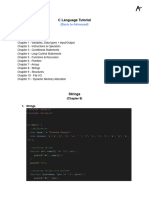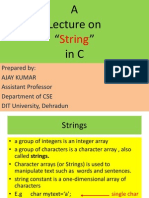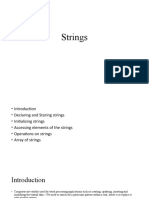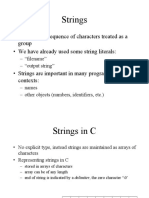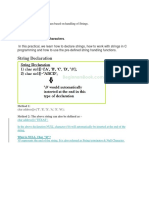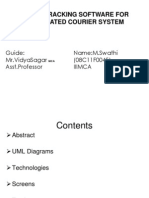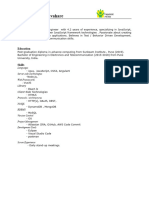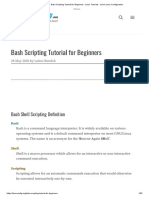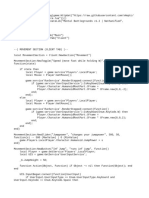0% found this document useful (0 votes)
24 views5 pages2 String
This C code document demonstrates various string manipulation functions in C including initializing and assigning string values, reading strings from user input, copying and modifying strings, and looping through strings. It includes 10 code demos showing how to:
1) Initialize string variables and assign values
2) Read strings from user input using scanf(), fgets(), and getchar()
3) Copy strings using strcpy() and check string lengths with strlen()
4) Replace and toggle characters in strings using functions like toupper() and tolower()
5) Loop through strings using while and for loops to count characters or modify string values
The document provides examples of common string operations in C like initialization, input/output,
Uploaded by
phubase.sanCopyright
© © All Rights Reserved
We take content rights seriously. If you suspect this is your content, claim it here.
Available Formats
Download as TXT, PDF, TXT or read online on Scribd
0% found this document useful (0 votes)
24 views5 pages2 String
This C code document demonstrates various string manipulation functions in C including initializing and assigning string values, reading strings from user input, copying and modifying strings, and looping through strings. It includes 10 code demos showing how to:
1) Initialize string variables and assign values
2) Read strings from user input using scanf(), fgets(), and getchar()
3) Copy strings using strcpy() and check string lengths with strlen()
4) Replace and toggle characters in strings using functions like toupper() and tolower()
5) Loop through strings using while and for loops to count characters or modify string values
The document provides examples of common string operations in C like initialization, input/output,
Uploaded by
phubase.sanCopyright
© © All Rights Reserved
We take content rights seriously. If you suspect this is your content, claim it here.
Available Formats
Download as TXT, PDF, TXT or read online on Scribd
/ 5
